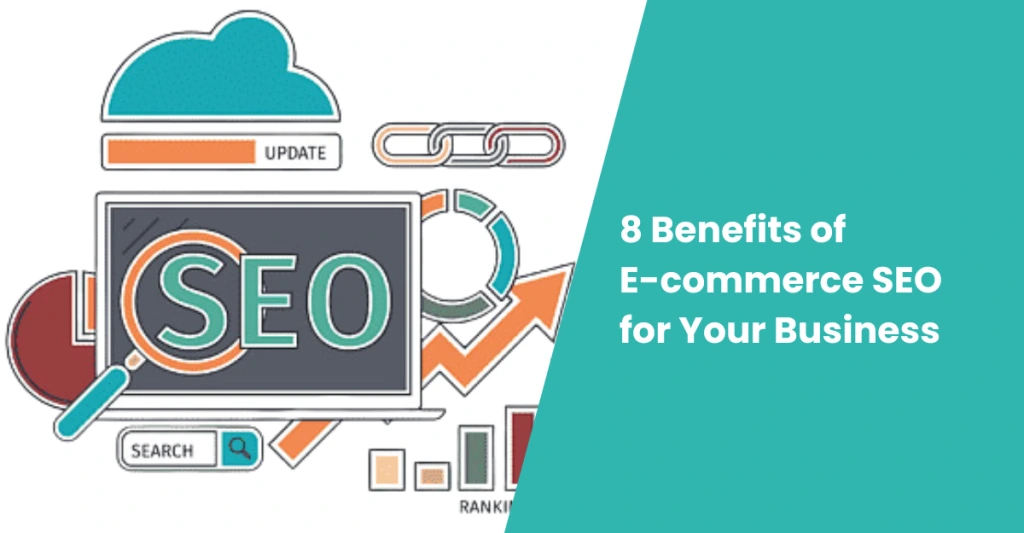E-commerce websites can benefit greatly from search engine optimization. Although SEO offers one of the highest returns on investment of any e-commerce SEO agency marketing effort, many online stores are built with little to no thought given to search engines. They rely on sponsored advertisements or social media, which can benefit businesses but usually need ongoing work and revenue. Companies lose billions of dollars annually on advertising spending, which will only rise with time.
However, the main work of SEO is done upfront; after you rank, you can generate revenue on autopilot at no additional cost. Remembering this, you can unlock and alter your e-commerce company by following the SEO best practices.
Why is E-commerce SEO Important?
Let’s explore why investing in E-commerce SEO is not just important but essential for the success and sustainability of your digital business.
Visibility in a Sea of Websites:
Let us consider your online store a small boat navigating the vast ocean of the internet. With effective E-commerce SEO, your boat can stay aware of the sea of competing websites. SEO techniques, such as strategic keyword placement and optimization, ensure that your ship is seen and guided toward the shores of search engine results. Improved visibility means more chances of attracting potential customers searching for products or services you offer.
Targeted Traffic and Qualified Leads:
E-commerce SEO isn’t just about attracting traffic; it’s about drawing the right audience—those actively seeking what you have to offer. By optimizing your website for relevant keywords, you ensure that your best digital marketing agency in the Mumbai storefront is prominently displayed to users who are more likely to convert into customers. This targeted approach increases the quantity of traffic and, more importantly, enhances the quality, leading to higher conversion rates.
Building Credibility and Trust:
Customers trust what they find at the top of search results. Effective E-commerce SEO boosts your rankings and establishes your online store as a credible and trustworthy source. The mere fact that your website appears prominently in search results instills confidence in potential customers, making them more likely to choose your products or services over competitors.
Enhanced User Experience:
SEO isn’t just about pleasing search engines; it’s about creating a seamless and enjoyable experience for your website visitors. Optimizing your site structure, improving page load times, and ensuring mobile responsiveness contribute to a positive user experience. This, in turn, can lead to higher retention rates, increased engagement, and a greater likelihood of customers returning for future purchases.
Best Features of E-Commerce SEO
Let’s dive into the top 5 features that make e-commerce SEO stand out and contribute to the success of online businesses.
Keyword Optimization and Research:
Influential e-commerce SEO blogs start with thorough keyword research. They understood potential customers’ specific terms and phrases when searching for products. Incorporating these keywords naturally into your content helps search engines recognize the relevance of your blog to user queries.
Consider using long-tail keywords specific to your products or industry to excel in keyword optimization. These phrases often have lower competition, making it easier for your blog to rank higher in search results.
High-Quality Content:
Quality content is king when it comes to SEO. Your blog should provide valuable information, answer user queries, and engage your audience. Well-researched, informative, and unique content attracts readers and encourages them to stay on your site longer, reducing bounce rates—a factor search engines consider when ranking pages.
Use multimedia elements such as images, videos, and infographics to enhance the user experience. Visual content can break up text, making your blog more appealing and shareable.
Mobile-Friendly Design:
With the increasing use of smartphones, optimizing your e-commerce blog for mobile devices is no longer an option—it’s a necessity. Search engines prioritize mobile-friendly websites, so ensure your blog is responsive and provides an excellent user experience on all screen sizes.
Consider implementing a mobile-first design approach, where the layout and functionality are initially designed for mobile users and then adapted for larger screens. This improves your SEO and caters to the growing number of users accessing websites on their mobile devices.
Internal and external linking:
Building a strong network of internal and external links within your e-commerce blog is vital for SEO success. Internal links help search engines navigate your site and understand the hierarchy of your content. They also encourage users to explore more pages on your site, increasing engagement and time spent on your platform.
External links, or backlinks from reputable websites, can boost your blog’s credibility and authority. When other sites link to your content, search engines interpret it as a sign that your information is valuable and trustworthy.
User-Friendly URL Structure:
A clean and user-friendly URL structure improves the overall user experience and enhances SEO. Avoid long, convoluted URLs with unnecessary parameters. Instead, create concise and descriptive URLs that include relevant keywords.
A well-structured URL helps users understand the page’s content but also assists search engines in crawling and indexing your site more efficiently. Using hyphens to separate words makes reading and comprehending the URL accessible for users and search engines.
The process of e-commerce SEO
Online shopping Using search engine optimization (SEO), you can increase traffic to your store by increasing its visibility on search engine result pages (SERPs). Since more people will visit a well-ranked page, you should aim for the highest possible ranking.
In contrast to paid advertisements, which charge you per click to drive traffic to your online store, SEO enables you to obtain highly relevant visitors almost entirely free. SEO determines how well search engines—including Google, Bing, and Yahoo—rank your online store.
It’s essential to focus on the content of your online store if you want to increase SEO. You may enhance your e-commerce SEO by creating thorough product pages for your online store, optimizing your product descriptions, starting a blog,
You must make sure your website is search engine optimized if you want your web pages to appear higher in search engine results.
Below are some illustrations of what this looks like:
– Your web store’s technical specifications
– Does your online store work on mobile devices?
– They all affect how well your e-commerce pages rank in search engine results pages (SERPs), including Google.
Conclusion
You will be losing out on potential brand expansion if you don’t have a well-planned SEO strategy. But keep in mind that SEO is a waiting game that requires careful planning and perseverance to provide the best results. Making a mediocre effort is preferable to doing nothing at all. AdsCult is the ideal option if you’re considering trying SEO for your company.



